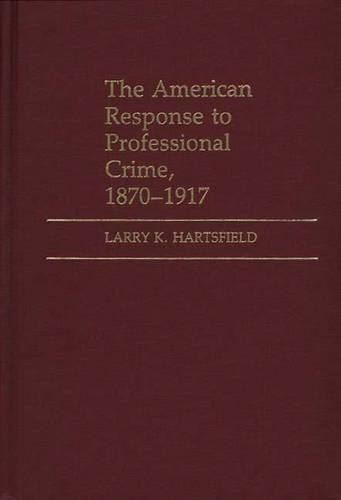
The American Response to Professional Crime, 1879-1917
(Hardback)
Publishing Details
The American Response to Professional Crime, 1879-1917
By (Author) Larry K. Hartsfield
Bloomsbury Publishing PLC
Praeger Publishers Inc
24th July 1985
United States
Classifications
Tertiary Education
Non Fiction
Literature: history and criticism
364.973
Physical Properties
Hardback
227
Description
Larry K. Hartsfield explores the impact of professional crime on American culture from multiple viewpoints. During the period under study the criminal played a central role in increasingly popular detective novels and also moved to center stage in serious fiction about the nature of humanity and the development of personality. Through autobiographies, thieves depicted themselves with characteristics that they perceived their audiences to expect. The criminal became especially prominent in a new subgenre of fiction, the literature of exposure, which included reform tracts about corruption in American life and exposes of urban crime and threats against the agrarian ethos. In addition, the thief was analyzed by doctors and sociologists. An extensive bibliography lists thousands of pages of neglected writing about American crime to complete this fascinating study of the American professional thief.
Reviews
This work treats the topic of the history of professional crime in the United States during the years 1870 to 1917 in a very fascinating, informative, and insightful style. It is more than a history, however, in that it brings a sociological perspective to an examination of the interplay between two major forces in the world of professional crime: the professional criminal and the detective. It is a symbiotic relationship, as Hartsfield explains, one in which, historically and socially, the detective's role and status are mutually tied to those of the professional criminal. We see how the status of the detective slowly changes from that of a low point in the period following the Civil War to one of celebrated admiration, as the hero of the detective story, in the late 1800s. Hartsfield allows us to see professional criminals through their own eyes, through their writings, which show us how they felt about the society that gave birth to their careers. This book should be of interest to those in law enforcement and to those historians and social scientists who deal with the study of crime.-Criminal Justic Review
"This work treats the topic of the history of professional crime in the United States during the years 1870 to 1917 in a very fascinating, informative, and insightful style. It is more than a history, however, in that it brings a sociological perspective to an examination of the interplay between two major forces in the world of professional crime: the professional criminal and the detective. It is a symbiotic relationship, as Hartsfield explains, one in which, historically and socially, the detective's role and status are mutually tied to those of the professional criminal. We see how the status of the detective slowly changes from that of a low point in the period following the Civil War to one of celebrated admiration, as the hero of the detective story, in the late 1800s. Hartsfield allows us to see professional criminals through their own eyes, through their writings, which show us how they felt about the society that gave birth to their careers. This book should be of interest to those in law enforcement and to those historians and social scientists who deal with the study of crime."-Criminal Justic Review
Author Bio
rtsfield /f Larry /i K.
